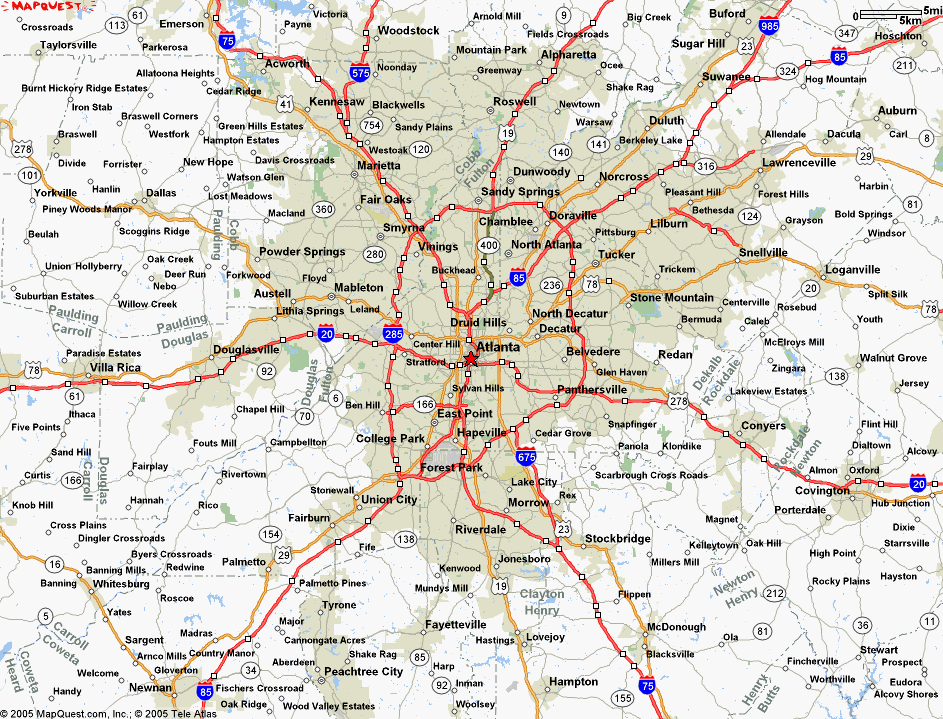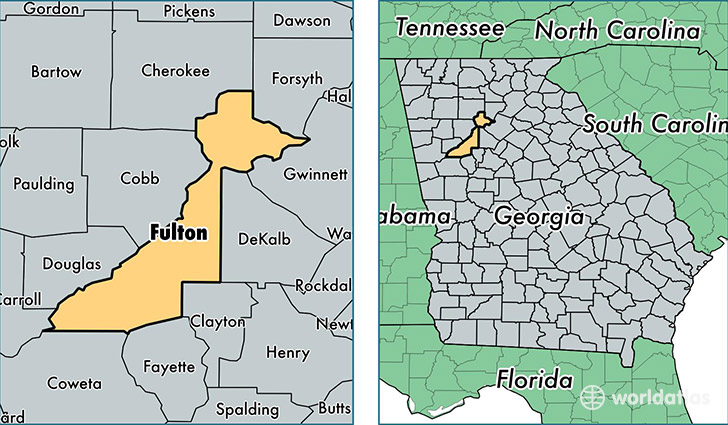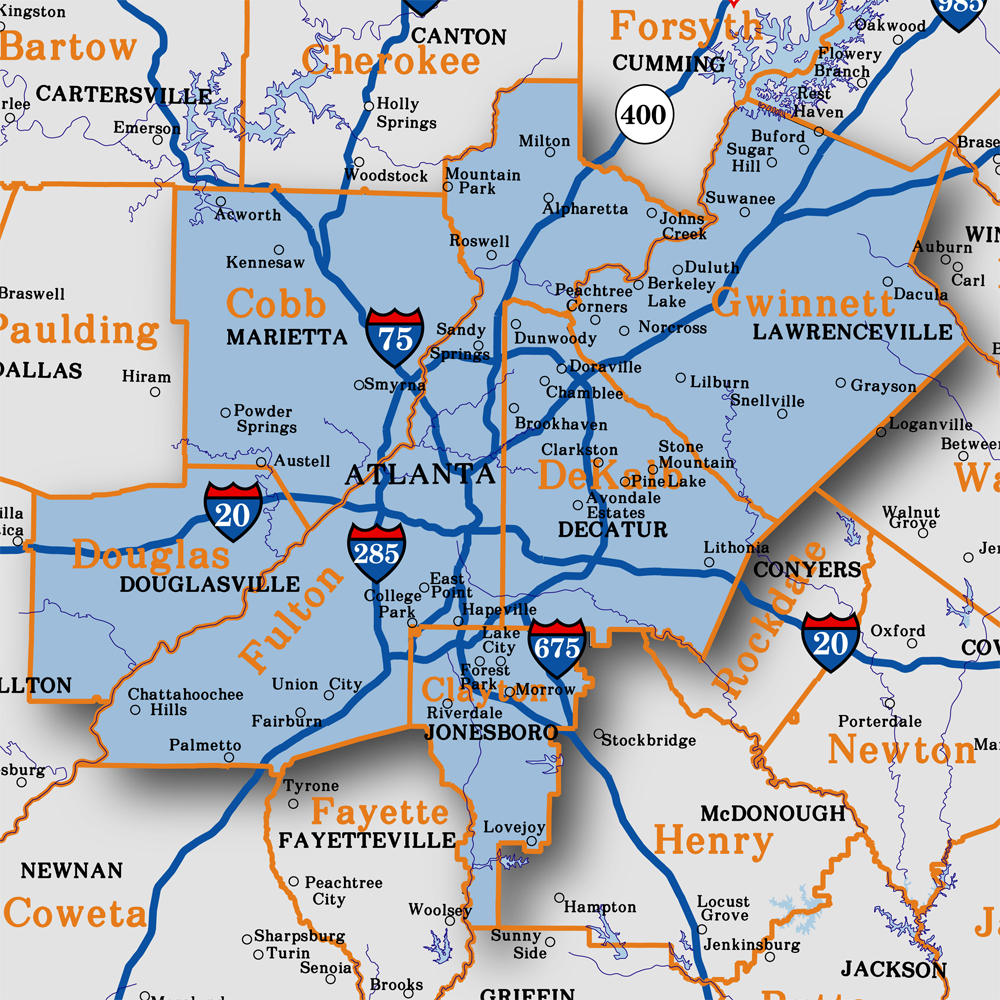Navigating the Tapestry of Metro Atlanta: A County-by-County Exploration
Related Articles: Navigating the Tapestry of Metro Atlanta: A County-by-County Exploration
Introduction
With enthusiasm, let’s navigate through the intriguing topic related to Navigating the Tapestry of Metro Atlanta: A County-by-County Exploration. Let’s weave interesting information and offer fresh perspectives to the readers.
Table of Content
Navigating the Tapestry of Metro Atlanta: A County-by-County Exploration

The Atlanta metropolitan area, a vibrant hub of commerce, culture, and innovation, encompasses a sprawling network of diverse counties. Understanding the unique characteristics of each county within this sprawling metropolis is crucial for anyone seeking to navigate its intricacies, whether for business, leisure, or simply appreciating the region’s geographic and cultural tapestry. This article delves into the diverse landscape of Metro Atlanta, providing a county-by-county exploration of its unique demographics, economic strengths, and distinct cultural identities.
A Mosaic of Counties: Unveiling the Metro Atlanta Landscape
The Metro Atlanta region, often referred to as the "Atlanta Metropolitan Statistical Area" (MSA), comprises 20 counties, each possessing its own distinct character and contributing to the area’s overall vibrancy. These counties, while interconnected by shared economic and social ties, offer a rich tapestry of urban, suburban, and rural settings, attracting residents and businesses with diverse needs and aspirations.
Navigating the Core: Fulton and DeKalb Counties
At the heart of Metro Atlanta lie Fulton and DeKalb counties, encompassing the city of Atlanta itself. These counties are home to major corporations, universities, and cultural institutions, driving the region’s economic engine. Fulton County, the most populous county in Georgia, houses the bustling downtown Atlanta area, with its iconic skyscrapers, vibrant entertainment scene, and bustling business district. DeKalb County, known for its diverse population and suburban charm, boasts a thriving arts scene, numerous parks and recreational facilities, and a strong educational system.
Exploring the Surrounding Counties: A Diverse Spectrum
Beyond the core of Fulton and DeKalb counties, Metro Atlanta’s diverse landscape unfolds. To the north, Forsyth and Gwinnett counties offer a blend of suburban living and burgeoning economic growth. Forsyth County, characterized by its rolling hills and family-friendly atmosphere, attracts residents seeking a peaceful lifestyle with easy access to Atlanta’s amenities. Gwinnett County, boasting a rapidly growing population, is a hub of technology and innovation, with a robust economy fueled by major corporations and a thriving business sector.
Moving westward, Cobb and Douglas counties present a mix of urban and suburban communities. Cobb County, known for its sprawling parks and recreational opportunities, offers a balance between urban convenience and suburban tranquility. Douglas County, with its rural charm and growing population, is attracting residents seeking a more affordable lifestyle with access to Atlanta’s amenities.
To the south, Clayton, Henry, and Fayette counties showcase a blend of suburban living and rural charm. Clayton County, with its diverse population and strong transportation infrastructure, offers a mix of residential and commercial areas. Henry County, known for its rolling hills and growing economy, attracts residents seeking a more rural lifestyle with access to Atlanta’s employment opportunities. Fayette County, with its picturesque landscapes and affluent communities, offers a tranquil setting for those seeking a more upscale lifestyle.
Beyond the Immediate Perimeter: Expanding the Metro Atlanta Landscape
The Metro Atlanta region extends beyond its immediate perimeter, encompassing a network of surrounding counties that contribute to the area’s economic and social fabric. These counties, while geographically distinct, are interconnected by shared economic and social ties, contributing to the region’s overall growth and development.
A Regional Economic Powerhouse: The Importance of Metro Atlanta’s County Network
The interconnected network of counties within the Metro Atlanta region plays a pivotal role in driving the area’s economic success. The diverse economic strengths of each county, ranging from technology and finance in the core to manufacturing and logistics in the surrounding areas, create a robust and resilient regional economy. This interconnectedness fosters collaboration and innovation, attracting businesses and investment, and solidifying Metro Atlanta’s position as a major economic powerhouse.
Navigating the Metro Atlanta County Map: FAQs
1. What are the key industries driving the economy of each Metro Atlanta county?
Each county within the Metro Atlanta region boasts its own unique economic strengths:
- Fulton County: Finance, technology, healthcare, and tourism.
- DeKalb County: Technology, healthcare, education, and aerospace.
- Gwinnett County: Technology, manufacturing, logistics, and healthcare.
- Cobb County: Aerospace, healthcare, manufacturing, and retail.
- Douglas County: Manufacturing, logistics, and healthcare.
- Clayton County: Healthcare, manufacturing, and logistics.
- Henry County: Manufacturing, logistics, and healthcare.
- Fayette County: Healthcare, education, and retail.
2. What are the major transportation hubs within each county?
The Metro Atlanta region boasts a comprehensive transportation network, with each county offering its own unique transportation infrastructure:
- Fulton County: Hartsfield-Jackson Atlanta International Airport (ATL), MARTA (Metropolitan Atlanta Rapid Transit Authority) rail system, major highways (I-75, I-85, I-20).
- DeKalb County: MARTA rail system, major highways (I-85, I-20, I-285).
- Gwinnett County: MARTA rail system (limited service), major highways (I-85, I-985).
- Cobb County: MARTA rail system (limited service), major highways (I-75, I-285).
- Douglas County: Major highways (I-20, I-85).
- Clayton County: MARTA rail system (limited service), major highways (I-75, I-285).
- Henry County: Major highways (I-75, I-85).
- Fayette County: Major highways (I-85, I-75).
3. What are the major cultural attractions and entertainment venues in each county?
Each county within the Metro Atlanta region offers a vibrant cultural scene:
- Fulton County: Georgia Aquarium, World of Coca-Cola, CNN Center, Atlanta Botanical Garden, High Museum of Art, Fox Theatre, Atlanta Symphony Orchestra.
- DeKalb County: Stone Mountain Park, Fernbank Museum of Natural History, Dekalb Symphony Orchestra, The Carter Presidential Library and Museum.
- Gwinnett County: Gwinnett Symphony Orchestra, Gwinnett Center, Gwinnett Playhouse, The Gwinnett History Center.
- Cobb County: Cobb Energy Performing Arts Centre, The Marietta Museum of History, The Southeastern Railway Museum.
- Douglas County: Douglasville History Museum, Douglasville Arts Council.
- Clayton County: Clayton County Historical Society, The Clayton County Arts Council.
- Henry County: Henry County Arts Council, The Henry County Historical Society.
- Fayette County: The Fayette County Arts Council, The Fayette County Historical Society.
4. What are the major universities and educational institutions in each county?
The Metro Atlanta region is home to numerous prestigious universities and educational institutions:
- Fulton County: Georgia State University, Emory University, Morehouse College, Spelman College, Clark Atlanta University, Georgia Tech.
- DeKalb County: DeKalb College, Agnes Scott College, Georgia Perimeter College.
- Gwinnett County: Gwinnett Technical College, Georgia Gwinnett College.
- Cobb County: Kennesaw State University, Southern Polytechnic State University.
- Douglas County: Douglasville State University.
- Clayton County: Clayton State University.
- Henry County: Clayton State University (Henry County Campus).
- Fayette County: Fayette County School System.
Tips for Navigating the Metro Atlanta County Map
- Consider your lifestyle preferences: Whether you prioritize urban convenience, suburban tranquility, or rural charm, each county offers a unique lifestyle.
- Research commuting options: The Metro Atlanta region boasts a complex transportation network. Consider your commuting needs and the availability of public transportation options in each county.
- Explore local attractions and amenities: Each county offers its own distinct cultural scene, with unique attractions, entertainment venues, and recreational opportunities.
- Consider the cost of living: The cost of living varies across different counties, with some offering more affordable housing options than others.
Conclusion: A Tapestry of Diversity and Opportunity
The Metro Atlanta region, with its diverse network of counties, offers a vibrant tapestry of opportunities for residents and businesses alike. Understanding the unique characteristics of each county is crucial for navigating its complex landscape, whether seeking a place to call home, a business location, or simply exploring the region’s rich cultural and economic offerings. From the bustling core of Fulton and DeKalb counties to the diverse suburban communities and rural charm of the surrounding counties, Metro Atlanta offers a multifaceted experience, making it a dynamic and thriving metropolis.








Closure
Thus, we hope this article has provided valuable insights into Navigating the Tapestry of Metro Atlanta: A County-by-County Exploration. We thank you for taking the time to read this article. See you in our next article!